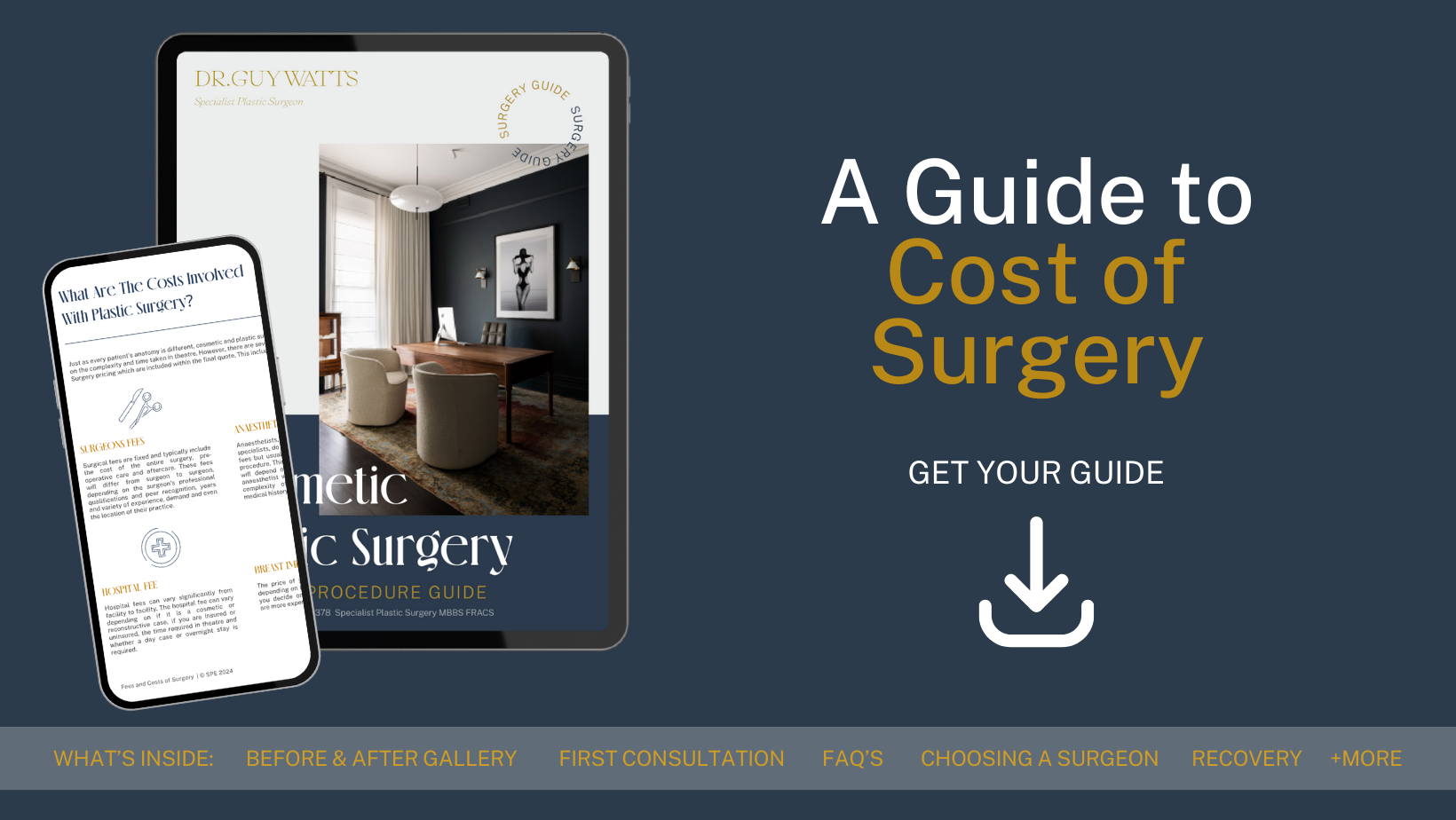Achieving and maintaining an optimal weight before your plastic surgery procedure is not just about looking good – it’s about ensuring your safety, promoting better healing, and maximising the results of your surgery.
One of the primary reasons Dr. Watts emphasises the importance of reaching a stable weight before surgery is to reduce potential risks and complications. Patients who are overweight or obese may face increased risks during anaesthesia and the surgical procedure itself. Excess body fat can make it more challenging to accurately estimate the required dosage of anaesthesia, potentially causing complications.
Moreover, carrying extra weight puts additional stress on your heart and lungs, which can increase the risk of cardiovascular and respiratory issues during surgery. By achieving a healthier weight, you’re reducing these risks and creating a safer environment for your procedure.
Your body’s ability to heal efficiently after surgery is important for achieving optimal results and reducing complications. Patients at a good weight typically experience faster and more effective healing processes compared to those who are overweight or obese.
Excess body fat can impair blood circulation, which is essential for delivering oxygen and nutrients to healing tissues. Poor circulation can lead to delayed wound healing, increased risk of infection, and prolonged swelling. Additionally, excess weight puts extra strain on incision sites, which can potentially cause wound separation or stretched scars.
By reaching a healthier optimal weight before surgery, you’re setting the stage for a smoother recovery process. Your body will be better equipped to heal efficiently, reducing the risk of complications and allowing you to enjoy your results sooner.
Body Mass Index (BMI) is a metric that plastic surgeons use to assess a patient’s suitability for various procedures. Knowing all about BMI and its impact on surgical outcomes can help you set realistic goals and expectations for your plastic surgery journey.
BMI is a way to use your height and weight to work out if your weight is within a good range. The formula for BMI is:
BMI = weight (kg) / [height (m)]²
While BMI is NOT an ideal measure of body fat or overall health, it has provided a efficient way for healthcare professionals to categorise weight and potential health risks.
BMI categories are typically defined as follows:
- Underweight: Below 18.5
- Normal weight: 18.5 to 24.9
- Overweight: 25 to 29.9
- Obese: 30 or greater
Dr. Watts prefers to perform elective cosmetic procedures on patients with a BMI between 18.5 and 29.9. This range is associated with the lowest risk of complications and optimal results.
For Dr. Watts, patients with a BMI of 30 or above (classified as obese) may be advised to lose weight before surgery.
Different plastic surgery procedures can be impacted by BMI in various ways:
- Abdominoplasty: This procedure is particularly sensitive to BMI. Patients with a high BMI may have a higher risk of complications such as seroma (fluid accumulation), delayed wound healing, and suboptimal results. Dr. Watts often recommends a BMI of 30 or lower for this procedure.
- Breast Augmentation: While BMI is less critical for breast augmentation compared to body procedures, being at a good, stable weight can optimise results. Patients with a higher BMI may experience more excess skin over time due to the additional weight of the implants.
- Liposuction: This fat removal procedure is not a weight loss solution and is most suitable for patients close to their optimal weight. Patients with a high BMI may be at higher risk for complications.
- Facelift: While facial procedures are less directly impacted by BMI, patients with a very high BMI may have more fatty tissue in the face and neck, which can affect the longevity of results.
- Body Lift: Similar to abdominoplasty, body lift procedures are typically recommended for patients with a BMI under 30 to reduce risks and optimise results.
Achieving your optimal weight before plastic surgery can seem like a lot of work, but with the right approach, it’s an attainable goal. Here are some effective strategies to help you lose weight safely and sustainably:
Start by setting achievable, time-bound goals. Aim for a steady weight loss of 0.5 to 1 kg per week. This gradual approach is more sustainable and less likely to result in weight regain. Remember, the goal is not just to lose weight as soon as possible, but to reach and maintain a good weight for your surgery and beyond.
A nutritious, balanced diet is essential for weight loss. Focus on:
- Lean proteins (chicken, fish, legumes) to support muscle maintenance and promote satiety
- Plenty of fruits and vegetables for essential nutrients and fibre
- Whole grains for sustained energy
- Good fats in moderation (avocados, nuts, olive oil)
Reduce your intake of processed foods, sugary drinks, and high-calorie snacks. Consider consulting a nutritionist for a personalised meal plan tailored to your needs and preferences.
Physical activity is key to effective weight loss and overall health. Aim for at least 150 minutes of moderate-intensity exercise or 75 minutes of vigorous-intensity exercise per week. This could include:
- Brisk walking or jogging
- Swimming
- Cycling
- Strength training
Remember to start slowly if you’re new to exercise and gradually increase intensity and duration. Always consult your doctor before starting a new exercise regimen, especially if you have any health concerns.
Proper hydration is often overlooked in weight loss journeys. Drinking adequate water can help:
- Boost metabolism
- Reduce hunger pangs
- Increase exercise performance
Aim for at least 8 glasses of water per day, and more if you’re exercising or in high temperatures or dry weather.
Quality sleep is important for weight management. Lack of sleep can disrupt hormones that regulate hunger and fullness which can cause overeating. Aim for 7-9 hours of sleep per night and establish a consistent sleep schedule.
Stress can lead to emotional eating and make it harder to stick to your weight loss plan. Incorporate stress-management techniques such as:
- Meditation or mindfulness practices
- Deep breathing exercises
- Yoga
- Regular physical activity
- Hobbies or activities you enjoy
Perth offers a wealth of resources to support your weight loss journey before plastic surgery. Here are some local options to consider:
Professional nutrition advice can be invaluable when trying to lose weight. Perth has several qualified nutritionists and dietitians who can provide personalised meal plans and support:
Nutrition IQ
- Website: nutritioniq.com.au
- Phone: (08) 9467 2228
- Address: Suite 16, 44 Kings Park Road, West Perth, WA 6005
Body Balancing Nutrition
- Website: bodybalancing.com.au
- Phone: +61 8 9388 1166
- Address: 22 Emerald Terrace, West Perth, WA 6005
Nutrition Clinic of W.A.
- Website: nutritionclinic.com.au
- Phone: 0425 640 198
- Address: Suite 40, Hillarys Shopping Centre, Cnr Flinders Ave & Waterford Drive, Hillarys, WA 6025
Regular exercise is important for weight loss. Perth has many fitness facilities catering to various preferences and fitness levels:
Revo Fitness
- Website: revofitness.com.au
- Address: Multiple locations including Northbridge and Subiaco, Perth, WA
- Specialties: Budget-friendly, 24/7 access, cardio and strength training equipment, functional training zones.
Anytime Fitness Perth
- Website: anytimefitness.com.au
- Phone: +61 8 9325 3789
- Address: 158-160 Murray Street, Perth, WA 6000
- Specialties: 24/7 access, global membership, functional and personal training, private showers and restrooms.
Bobridge Gym
- Website: bobridgegym.com.au
- Phone: +61 415 765 616
- Address: 225 Fitzgerald Street West Perth, WA 6005
- Specialties: Strength and functional training, cardio kickboxing, HIIT, spin classes, free weights, squat racks, personal training.
For those with busy schedules, meal delivery services can make sticking to a nutritious diet easier:
Fit Food Perth
- Website: fitfoodperth.com.au
- Address: Unit 4/17 Raymond Ave, Bayswater, WA 6053
- Specialties: Macro-counted, fresh, home-style meals with no preservatives, delivered to your door or available for pickup. They offer a diverse menu with new items weekly, focusing on nutritious and delicious options.
Youfoodz
- Website: youfoodz.com
- Specialties: Ready-made meals that are fresh, never frozen, and delivered straight to your door. They cater to various dietary needs and offer meals that are designed to be convenient, nutritious, and tasty.
While not specific to Perth, these widely-used apps can be valuable tools:
- MyFitnessPal: Features: Calorie counting, exercise logging, extensive food database
- Lose It!: Features: Personalised weight loss plans, barcode scanner, meal planning
By using these local resources, you’ll have a strong support system as you work towards your weight loss goals in preparation for your plastic surgery.
Planning your weight loss journey in preparation for plastic surgery requires careful timing. Starting too late may rush the process, while beginning too early could lead to weight fluctuations that affect your surgical outcomes. Here’s a general timeline to help you plan effectively:
6-12 Months before Surgery
- This is a good time to start your weight loss journey, especially if you have a significant amount of weight to lose. A longer timeline allows for:
- Gradual, sustainable weight loss: 0.5-1 kg per week
- Good habits: Development of good eating habits
- Exercise: Establishment of a regular exercise routine
- Health Issues: Time to address any health issues that may affect surgery
3-6 Months before Surgery
- If you’re closer to your optimal weight, this timeframe can be sufficient. Focus on:
- Diet and Exercise: Fine-tuning your diet and exercise regimen
- Target Weight: Reaching and maintaining your target weight
- Overall Health: Building strength and improving overall health
1-3 Months before Surgery
- At this stage, your focus should shift to:
- Stable Weight: Maintaining a stable weight
- Nutrition: Optimising nutrition for surgery preparation
- Exercise: Continuing regular exercise (with approval from your surgeon)
2-4 Weeks before Surgery
- In the final weeks before your procedure:
- Good Habits: Maintain your weight and good habits
- Pre-surgery Diet: Follow any specific pre-surgery diet instructions from your surgeon
- Exercise: Gradually reduce intense exercise as advised by your plastic surgeon
Keep in mind that fast weight loss immediately before surgery is not recommended. Your body needs to be in a stable, well-nourished state for optimal healing and recovery.
Throughout your weight loss journey, maintain open communication with your plastic surgeon. Dr. Watts can provide guidance on your progress and may adjust your surgery date if needed to ensure you’re at your optimal weight for the procedure.








